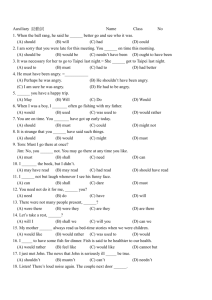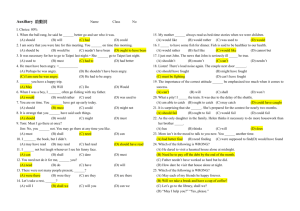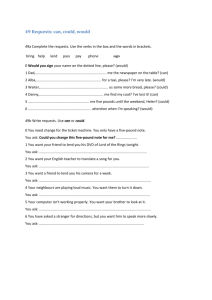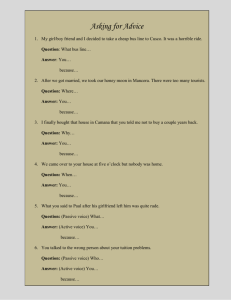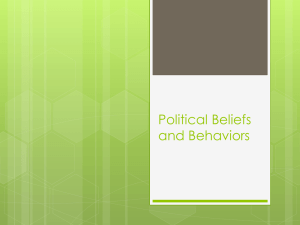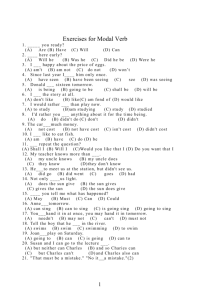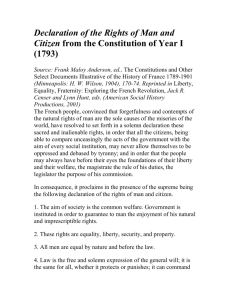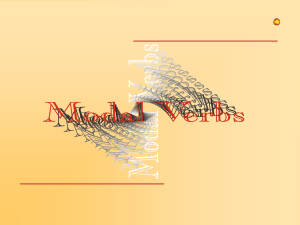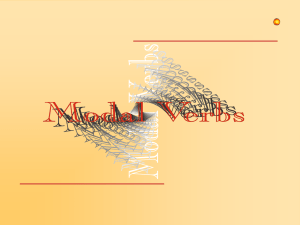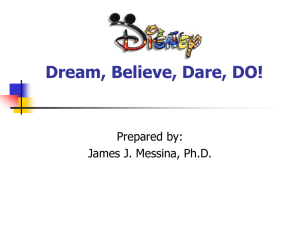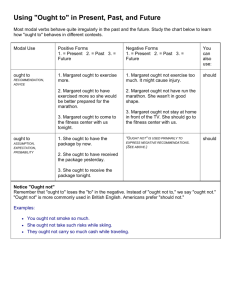情态动词/ Modals
advertisement
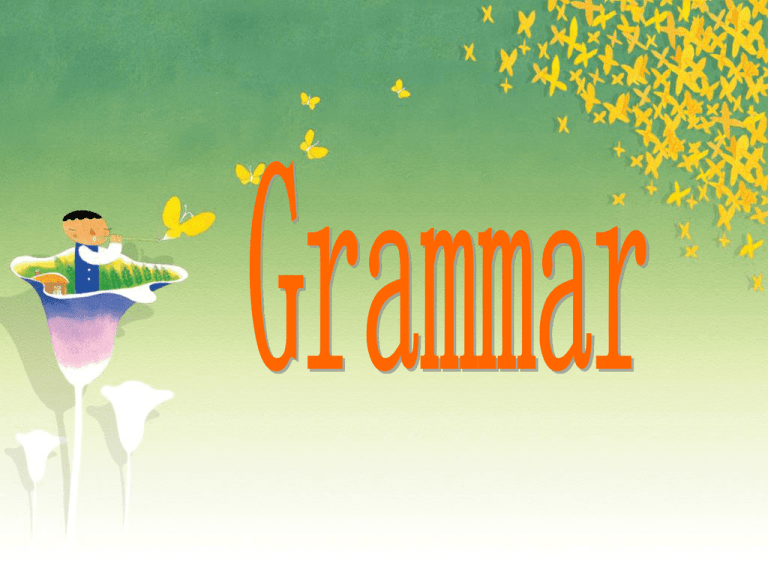
Types 1. 词形没有变化形式的有:must, should, shall, had better. 2. 词形有变化形式的有:can (could), may (might), will (would). 3. 带to的词有:ought to, used to, have to. 4. 可以是情态动词和行为动词,具有双重性的有: dare, need. 5. 有人称和数的变化: have to, be able to. Study the following sentences: 1. 2. 3. 4. 5. 6. 7. 8. 9. 10. 11. 12. 13. 14. As students, you must study hard. You shall have my answer tomorrow. You should listen to the doctor’s advice. You’d better do it yourself. He can stand on his head against the wall. I said that I could go. You may sit in the front rows. It might help a little if you would only keep clean. Fish will die out of water. We would often find him lying on bed and reading. He said you ought to tell the police. I don’t have to be in such a hurry. She dare not walk alone at night. The child has been able to read short stories. 情态动词的作用:情态动词表示说话 人对动作的态度,如需要,可能,意愿,或 怀疑等.情态动词本身有一定的意义,但 不完全,不能单独做谓语,必须与不带to 的动词不定式(ought除外)连用.它无人 称和数的变化. (1)can, could和be able to 当表示现在,将来以及泛指过去的能力,三者可以互换使用: As a child, he could play the violin fairly well. = As a child, he can play the violin fairly well. =As a child, he is able to play the violin fairly well. Can (could)和 be able to 的异同. 共同点: 在表能力方面,三者是相同的.由于can 只有过去式 could, 所以在其他时态中,需要用 be able to 来适应相关的变化形式. I have been able to write long passages in English. (我已能用英语写大段文章了.) She could (was able to) speak a little English. (当时她会说一点儿 英语.) 不同点:(1).表能力时,can (could)表示自然的,一般的能力,be able to 表示经过一定努力,或借助一定手段的能力.在同一语境中既 有又有时,这种实际意义的差别更为明显. At the beginning he couldn’ t answer the question. But after thinking over and doing some experiments, he was able to answer them correctly. (2).can(could)可用来表示可能性,请求,许可和推测, be able to 只用 来表能力. Can (May) I use your dictionary? 注意事项:can( could) 和be able to不能叠用,而be able to 可和其他情 (2)may 和might :may的过去式是 might,表示允许和征 询对方许可,意谓“可以”,表示可能性,might 语气更委 婉. -May I use your pen? -Yes, of course. Might I have your e-mail address? Might I give you some advice? 注意:在表推测或可能的估计时,must>may> might They must be in the classroom.他们一定在教室里. Tom might finish it next week.汤姆或许能在下周完成它. (3)must 和have to 表示“必须”,“应该”.强调主观责 任性,否定回答常用 need not/needn’t 或 don’t have to. -Must I finish my work before 10 o’clock? - No ,you needn’t (don’t have to). have 表示“必须”,“应该” “不得不”, 是客观要求,外因所迫. I don’t have to worry so much. must (4)ought to You ought to follow your father’s advice. At your age, you ought to be earning your living. Your father ought not to smoke so much. You ought to go to see the doctor’ (5)Shall和 should What shall we do next? You should do it at once. You should listen to the doctor’s advice. It is strange that he should pass the exam. I am so sorry that Mike should be so silly. 注意:Shall一般用于第一,三人称问句中. Where shall we wait for you? Shall he come at once? (6)used to: I used to live in the countryside when I was very young. 注意:used to 和would They used to play games in the woods nearby. They would run after each other or play Father and Mother.那时候他们常在附近的树林里做游 戏,互相追逐或装扮爸爸妈妈. (7)will和would They promised that they would do their best to help us. Some birds will fly to the south when winter comes. I would sit there thinking for hours. This will be the problem you are facing. (8)need 作情态动词,通常用在否定句或疑问句中. You needn’t do the exercises if you find it too easy. Need they come again tomorrow? He said he need not hurry. 作行为动词:其变化形式与其他实义动词相 同. You don’t need to hurry like this. . (9)dare 做情态动词:用于否定句,疑问句或条件句, 其过去式为dared,但没有人称和数的变化. No one dared say that he could not see the Emperor’s new clothes. I dare not face him. 做行为动词:其变化形式与其他实义动词的 变化形式一样. Who dares to do it? (10) Useful sentences about the grammar Every time he meets me, he will smile to me . The swimmer was very tired but he was able to reach the shore before the sunset. Hurry up! Tom must be waiting for us at the school gate. I didn’t know whether he dare try. Did he have to tell them about it? -Must I do that thing today? -Yes, you must. (No, you needn’t/don’t have to.) Read aloud all the example sentences on each page.
